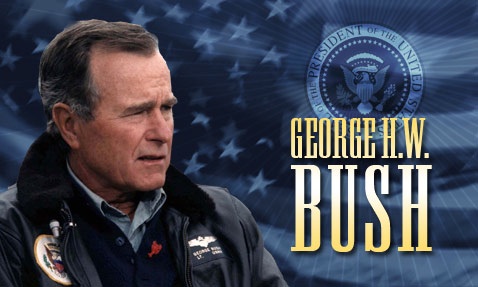President George H.W. Bush is an intriguing political figure. He was a popular wartime president and foreign policy expert. Yet, his presidency was only one term due to failings in communication and domestic policy. I recently read Jon Meacham’s excellent biography, Destiny and Power: The American Odyssey of George Herbert Walker Bush. As an old history major, I find biographies fascinating. Meacham’s account was quite well done and left me thinking about leadership lessons from George H.W. Bush.

George H.W. Bush was as well prepared to assume the presidency as anyone in modern history. He was a decorated pilot in World War II. He served in Congress, as Ambassador to the United Nations, Republican National Committee chair, and eight years as Vice President.
Bush lead during a time of tremendous change with the collapse of the Soviet Union, the reunification of Germany, and the first Gulf War.
However, President Bush also struggled with communicating his vision for the country as well as his domestic policy priorities.
In addition, he was distrusted by movement conservatives within his own party which confronted him through much of his political career.
After reading Meacham’s book, three leadership lessons seem relevant for higher education leaders and more generally.
1) Never show up the boss
The vice presidency is a difficult job. There are only two real formal responsibilities. The power of the position largely comes from a relationship with the president. When he began serving as President Reagan’s vice president, Bush declared his goal was to never show up the boss. He wouldn’t upstage Reagan. One story from the book particularly struck me. After the assassination attempt on Reagan, Vice President Bush was returning to Washington. The Secret Service wanted Bush to land on the South Lawn of the White House. Despite several attempts to convince him, Bush refused. He said that was reserved for the president and he was worried that his doing so would show up President Reagan. Instead, Vice President Bush was driven by motorcade to the White House.
All of us in higher education, particularly those in administration, could learn from this lesson. Never show up the boss. There may be an opportunity to showcase our abilities or take credit for something. Never do this. It will backfire more often than not. Moreover, showing respect and not upstaging your leadership will build loyalty and trust that is far more valuable than a moment of glory.
2) Understanding and appreciating the values of different generations
As a member of the Greatest Generation, Bush fought in World War II and came home to lead his country. Later in his life and during his presidency, Bush felt like values such as duty, honor, and service were no longer held sacred. Whether this was true is debatable, but the lesson here is to appreciate and understand the values of different generations. There is probably no organizational type that houses as many generations as colleges and universities. Not only do students represent a new generation, but faculty and staff are made up of two different generations. As higher education leaders, we would do well to remember this when leading institutions. Decisions and expectations are different across generations. Thinking about these difference and considering the implications of this for leading campuses will help you make, implement, and communicate decisions better.
3) The importance of family
Much of Meacham’s book is drawn from interviews with Bush himself as well as his friends and colleagues. Additionally, Meacham draws from Bush’s extensive diaries. Throughout the book, you get a sense of Bush’s love and support of his family. His parents, Barbara, and his children. His love and need for Barbara comes through. The love and respect for his parents comes through. His love and hopes for his children. I knew that Bush had lost a daughter due to cancer at a young age. Yet, it was heartbreaking to hear how he went through the experience and how it never left him. Despite all of his accomplishments and triumphs, Bush had his family top of mind. Regardless of one’s opinion of Bush’s presidency, his son’s presidency, or his politics generally, you have to respect and admire his love of family.
Leadership lessons from biographies
There are many more leadership lessons from George H.W. Bush. Reading biographies is a wonderful to not only learn about history and historical figures. I find them valuable for thinking about my own life, career, and leadership. If you’re looking for a great one to read, I highly recommend Jon Meacham’s Destiny and Power.

